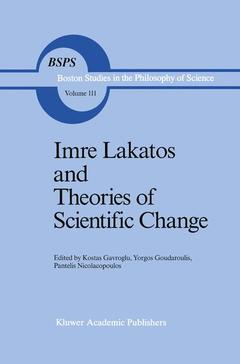Description
Imre Lakatos and Theories of Scientific Change, 1989
Boston Studies in the Philosophy and History of Science Series, Vol. 111
Coordinators: Gavroglu K., Goudaroulis Yorgos, Nicolacopoulos P.
Language: English
Publication date: 10-2011
465 p. · 15.5x23.5 cm · Paperback
465 p. · 15.5x23.5 cm · Paperback
Description
/li>Contents
/li>
How happy it is to recall Imre Lakatos. Now, fifteen years after his death, his intelligence, wit, generosity are vivid. In the Preface to the book of Essays in Memory of Imre Lakatos (Boston Studies, 39, 1976), the editors wrote: ... Lakatos was a man in search of rationality in all of its forms. He thought he had found it in the historical development of scientific knowledge, yet he also saw rationality endangered everywhere. To honor Lakatos is to honor his sharp and aggressive criticism as well as his humane warmth and his quick wit. He was a person to love and to struggle with. The book before us carries old and new friends of that Lakatosian spirit further into the issues which he wanted to investigate. That the new friends include a dozen scientific, historical and philosophical scholars from Greece would have pleased Lakatos very much, and with an essay from China, he would have smiled all the more. But the key lies in the quality of these papers, and in the imaginative organization of the conference at Thessaloniki in summer 1986 which worked so well.
I.- The Methodology of Scientific Research Programmes: A Retrospect.- Deductive Heuristics.- Development of Science as a Change of Types.- Methodology and Ontology.- Imre Lakatos in China.- On the Characterization of Cognitive Progress.- II.- Continuity and Discontinuity in the Definition of a Disciplinary Field: The Case of XXth Century Physics.- Determinism, Probability and Randomness in Classical Statistical Physics.- The Emergence of a Research Programme in Classical Thermodynamics.- The Methodology of Scientific Research Programmes and Some Developments in High Energy Physics.- Many-Particle Physics: Calculational Complications that Become a Blessing for Methodology.- The Relative Autonomy of Theoretical Science and the Role of Crucial Experiments in the Development of Superconductivity Theory.- III.- Lakatos on the Evaluation of Scientific Theories.- Methodological Sophisticationism: A Degenerating Project.- Through the Looking Glass: Philosophy, Research Programmes and the Scientific Community.- A Critical Consideration of the Lakatosian Concepts: “Mature” and “Immature” Science.- Bridge Structures and the Borderline Between the Internal and External History of Science.- IV.- Corroboration, Verisimilitude, and the Success of Science.- Machine Models for the Growth of Knowledge: Theory Nets in PROLOG.- Louis Althusser and Joseph D. Sneed: A Strange Encounter in Philosophy of Science?.- On Incommensurability.- Partial Interpretation, Meaning Variance, and Incommensurability.- Scientific Discovery and Commensurability of Meaning.- V.- Proofs and Refutations: A Reassessment.- Counterfactual Reduction.- Research Programmes and Paradigms as Dialogue Structures.- Philosophy of Science and the Technological Dimension of Science.- Falsificationism Looked at froman “Economic” Point of View.- VI.- The Bayesian Alternative to the Methodology of Scientific Research Programmes.- Frege and Popper: Two Critics of Psychologism.- Has Popper Been a Good Thing?.- Popper’s Propensities: An Ontological Interpretation of Probability.
© 2024 LAVOISIER S.A.S.




